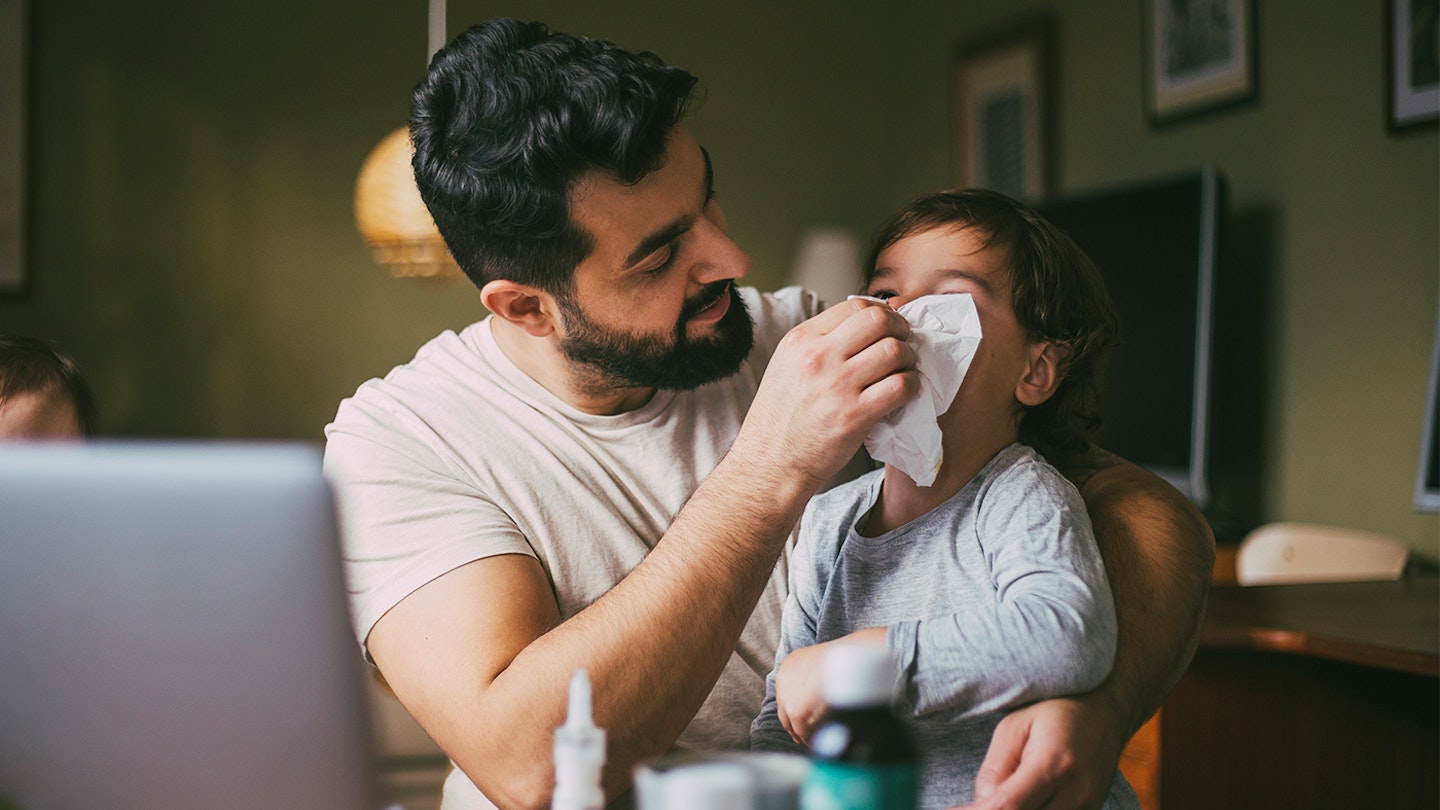Sniffles? Sneezes? Reflux? Constipation? Baby snoring at night? Your little one could well be suffering from an allergic reaction and with baby allergic reactions on the rise, it's no surprise.
"A study looking at the incidence of peanut allergy in children on the Isle of Wight alone found the problem trebled between 2000 and 2010," says consultant paediatric allergist Dr Adam Fox, co-author of The Allergy-Free Baby and Toddler Book. But despite this, no one is sure why the incidence of allergies is increasing.
What causes baby allergic reactions?
"Allergies are complex," explains Adam. "When a child has an allergic reaction, their immune system responds inappropriately to a particular substance, called an allergen. There are a wide range of known allergens, from cat dander [flakes of skin in the fur] to cow's milk to dust mites. When their body senses the allergen, it prompts a particular group of cells – mast cells – to release a chemical called histamine. Histamine makes the child’s airways shrink, so it can be hard to breathe. It also leads to the classic allergy symptoms, like a bunged-up nose, itchy eyes and hives."
You may recognise allergies by a different name too: baby eczema affects the skin while asthma affects the airways. Hay fever affects the nose and eyes, while a food allergy affects the stomach or skin.
Food allergies vs environmental allergies: what's the difference?
While environmental allergies are a response to things we come into contact with in our surroundings or that we inhale throughout the day (such as pollen or dust mites), food allergies are a reaction to something we've consumed: e.g. food and drink.
Is my baby having an allergic reaction?
On rare occasions, the release of histamine can cause a severe physical reaction called anaphylaxis. This is an acute, whole-body response to the histamine and it’s potentially life-threatening.
There are two types of allergic reactions. In an immediate allergic reaction, symptoms occur as soon as your baby is exposed to the allergen. In a delayed reaction, the symptoms build up over time. "With a delayed reaction, a child can have chronic symptoms, such as baby reflux, diarrhoea or constipation. And it’s much harder to work out which substance is causing the allergy," says Adam.
Symptoms of a mild allergic reaction in babies
It's common for children experiencing a mild allergic reaction to have one of the following symptoms:
• Sneezing, itchy or runny nose
• Itchy mouth
• A few isolated hives or mild itching
• Mild nausea or gastrointestinal discomfort
More than one of these symptoms would constitute a more severe reaction.
Symptoms of a severe allergic reaction in babies
A severe allergic reaction would include any of the following symptoms, either alone or combined.
• Shortness of breath, repetitive cough, wheezing
• Swelling of face, lips, or tongue
• Widespread hives on the body
• Pale, ashen or bluish skin
• Repetitive vomiting
• Sudden tiredness or seeming limp
When should I see a GP?
If you suspect your baby is having or has had a mild allergic reaction, take them to your GP, who may refer them to a specialist. Keep a diary of your child’s symptoms and what may have triggered them. In many cases, allergies can be managed by avoiding the trigger or by prescribed medication. And don’t worry that your baby will suffer from this allergy for life. "Children can just outgrow their allergies,’ says Adam. "It’s just that, once again, we don’t know why."
If your child is showing symptoms of a severe allergic reaction, you should call 999 immediately.
Why has my baby got an allergy?
There’s no surefire way to tell if your baby is likely to develop an allergy or what sort of allergy it will be. But if you have a history of allergies in your family, your baby is more likely to suffer. In families with a history of them, over half children go on to develop an allergy themselves. Whereas in families without a history of allergies, only one in five children is affected. "But the child won’t necessarily have the same allergy as their parents or siblings," says Adam.
Large-scale trials have previously been run to ascertain if allergies were reduced when mums avoided certain foods during pregnancy and breastfeeding. The results showed that what a breastfeeding mother ate didn’t affect whether her baby went on to develop an allergy. That’s why the current advice from the NHS is that women can eat food like peanuts during pregnancy, as long as they aren’t allergic to them themselves.
Breastfeeding your baby for the first four to six months can help protect your child against allergies but "breastfeeding doesn’t mean that a child won’t get an allergy," adds Adam. "However it does help to reduce the risk because the antigens in breast milk can make a child less susceptible."
How allergies are linked
Eczema, asthma, hay fever and food allergies affect a baby’s body in different ways, but they are linked. Having one condition can predispose your baby to develop other allergic responses. "This is called the 'allergic march’" explains Adam. "This refers to the way children can progress through different allergic responses: from eczema to food allergies to hay fever to asthma. One warning sign is if your child has eczema and an egg allergy – 70% of those children go on to get a respiratory allergy, like asthma."
About the expert
Consultant paediatric allergist Dr Adam Fox is the co-author of The Allergy-Free Baby and Toddler Book. Adam’s private practice, Allergy London, was awarded ‘Best Allergy Clinic – London’ in the 2019 Global Health & Pharma Private Healthcare Awards. He was also recognised by Doctify for ‘Excellent Patient Experience’ in 2018 and was one of 29 specialists to receive the ‘Top Doctors award’ in 2018 from Top Doctors website
